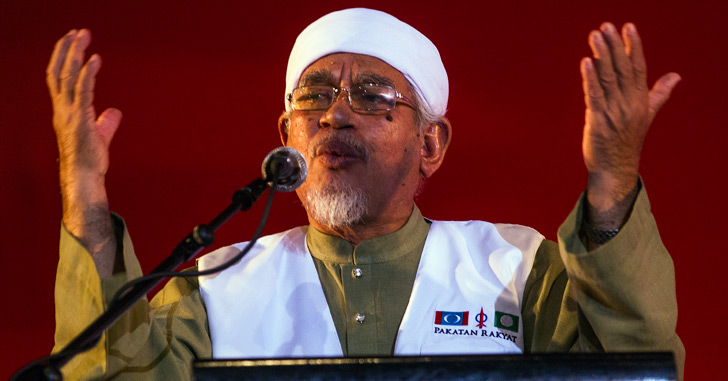A bid in Malaysia’s parliament to introduce the strict Islamic penal code known as hudud could have far-reaching consequences
Last week, a politician from the opposition Pan-Malaysian Islamic Party (PAS) tabled a bill proposing the introduction of a strict Islamic penal code. Parliament will debate the “Hudud Bill”, as it is known, in October. If passed, current provisions in Malaysia’s sharia courts could eventually be replaced with harsher hudud punishments. Islamic hudud law permits penalties such as stoning and amputations.

Although the bill, submitted by PAS president Abdul Hadi Awang, only covers the northeastern state of Kelantan, there are fears that it could be rolled out nationwide.
In Malaysia’s parliament, the United Malays National Party, the party of Prime Minister Najib Razak, has a majority and it rules in a coalition called the Barisan Nasional (BN). But a billion-dollar scandal over financial impropriety at state wealth fund 1MDB under Najib’s purview has damaged the government’s standing. Hudud is well thought of among the Muslim Malay majority.
According to Clive Kessler, a sociology professor at the University of New South Wales, UMNO is supporting the bill in an attempt to use PAS to shore up its popularity with Malays.
Later this month, two important by-elections are to be held in Muslim Malay majority Sungai Besar and Kuala Kangsar, which will act as final test of the coalition’s performance before the next general election.
In the Straits Times yesterday, Sin Chew Daily columnist Tay Tian Yan explained that the ruling coalition has irreversibly lost the support of non-Malays, especially Chinese Malaysians who have largely become hostile to the party. “Counting on a return of Chinese votes to BN is a wild, wild dream,” he wrote. “They have to put all their stakes on Malay voters now to win these two seats. So they come up with a religious card, telling the voters UMNO too can accept hudud, in a bid to win their favour while diverting the voters’ attention from 1MDB.”
Although this may be a pragmatic short-term strategy, it is a major long-term gamble in terms of the country’s social cohesiveness. Between 42% and 43% of Malaysia’s population is non-Muslim and 90% of them would not agree to Islamic law, said James Chin, director of the Asia Institute at the University of Tasmania. “They are worried that this is the first step towards the full implementation of sharia laws in Malaysia.”
By trying to broaden UMNO’s support base and cement his own position within the party, Najib risks two things, according to Robert Broadfoot, managing director of Political & Economic Risk Consultancy: weakening the strength of the other ethnic parties that make up BN and further upsetting the delicate racial and religious balance by driving even more ethnic Chinese and Indians to the opposition parties.
“Moreover, by pandering more to conservative Muslims, Najib might win support back from PAS but he is in danger of making more moderate Malays feel more comfortable with the opposition Parti Keadilan Rakyat than with UMNO,” Bhatia added.
Malaysia’s non-Malay population has reacted with widespread condemnation of the proposed law, with leading figures in BN among those who spoke out. Transport minister Liow Tiong Lai, along with three other cabinet members, vowed to resign if hudud was introduced. And non-Malay BN leaders from Sabah and Sarawak – states with Muslim chief ministers – said they would vote against its implementation in eastern Malaysia.
For his part, Najib has played down people’s fears, stating that the law is not about introducing hudud. “It’s just to give the sharia courts enhanced punishments,” CNN reported him as saying. “From six-strokes caning to a few more.”
But others are not so sanguine. For the University of New South Wales’ Kessler, this is just another step toward a Malaysia irrevocably split along religious and ethnic lines. And if the government and PAS proceed, which he expects they will, the consequences will be “drastic, perhaps explosive”, with the possibility of an increase in non-Malay emigration from the country.
Any hopes that a parliamentary debate over hudud would serve to promote dialogue are unfounded. As Kessler wrote in an email: “It would simply signal [UMNO and the government’s] intention and implacable determination to impose the UMNO/PAS Islamist agenda on the entire nation, regardless of what the non-Muslims may think”.
In any case, as the Asia Institute’s Chin said, debate is “irrelevant” because the bill will “pass or die on Najib’s orders”.

